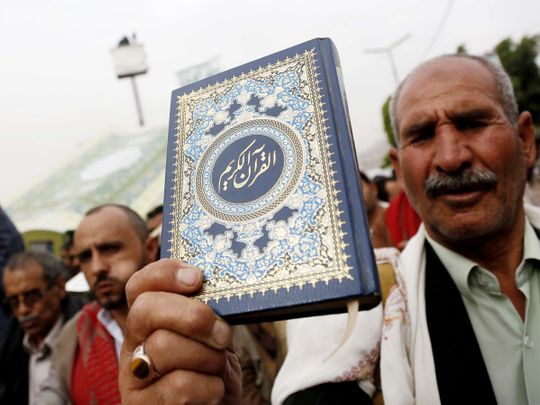
In recent months, Sweden has been thrust into the global spotlight due to a series of provocative Quran-burning incidents that have ignited a complex debate about the boundaries of freedom of expression and the need to protect religious beliefs and minority groups. These incidents, led by far-right provocateurs like Rasmus Paludan, have far-reaching implications for Sweden, extending to international diplomacy and security.
Paludan, a Danish-Swedish far-right politician known for his anti-immigration and anti-Islam stance, has been at the forefront of these provocative protests. He regularly travels around Sweden, burning copies of the Quran in areas with large Muslim populations. These provocative acts often lead to violent clashes between counter-protesters and police. In a troubling development, Salwan Momika, an Iraqi refugee in Sweden, has adopted a similar tactic, desecrating the Quran by tearing it up and setting it on fire.
These incidents have not only deeply offended Muslims in Sweden but have also sparked outrage among Muslim-majority countries. As a result, Sweden’s international image has been tarnished, and its diplomatic missions in the Middle East and North Africa have faced large-scale protests. The deteriorating security situation has forced Sweden to close its embassies in Pakistan and Iraq.
Fallout on Sweden
The diplomatic implications of these incidents are significant, as they have affected Sweden’s NATO membership bid and prompted international reactions. The Organisation of Islamic Cooperation has called for international law and collective measures to prevent future desecrations of the Quran. In July 2023, Muslim nations were instrumental in the United Nations human rights body approving a motion urging countries to review their laws and address gaps that may hinder the prevention and prosecution of acts and advocacy of religious hatred.
Sweden now faces a challenging dilemma. On one hand, it has a strong tradition of freedom of expression dating back to 1766, enshrined in its constitution. This guarantees the right to freedom of expression, including questioning religious messages. On the other hand, the Quran-burning incidents in several European countries have raised complex questions about whether freedom of expression should extend to acts that incite religious hatred and potentially lead to violence against minority communities. .
Notably, Quran burnings are allowed in Sweden, Denmark, and Norway but illegal in Finland. While Denmark’s government has presented a bill that could lead to a ban on burning the Quran, Sweden remains undecided. Most Swedes oppose Quran burnings, but there is a continuing debate on whether they should be allowed or banned. Sweden’s centre-left opposition has called on the government to address the Quran crisis and show leadership in resolving the issue.
Sweden is no longer the homogenous nation it was in 1766. According to a 2017 report from the Pew Research Center, 8.1 per cent of Sweden’s population is Muslim.
Changing the constitution is a complex process, making legislative action difficult. Sweden’s Prime Minister Ulf Kristersson has expressed a willingness to examine potential changes to the Public Order Act to allow police intervention in Quran burnings for national security reasons. However, implementing such changes is challenging given the government’s reliance on the anti-immigrant and anti-Islam far-right Sweden Democrats party, which supports the current centre-right government.
While police initially banned some of the Quran-burning gatherings due to concerns about public safety, the courts overruled these bans, arguing that the security risks were not directly linked to the gatherings. Sweden’s commitment to freedom of speech is deeply ingrained, but it has come at a significant cost, as these provocative protests have strained diplomatic relations with Muslim-majority countries, affecting trade and commerce. They have also raised domestic security concerns.
In the midst of these debates, it’s essential to recognise that free speech is not absolute, and it should never be used as a pretext for hate speech. Furthermore, Sweden is no longer the homogenous nation it was in 1766. According to a 2017 report from the Pew Research Center, 8.1 per cent of Sweden’s population is Muslim. In today’s globalised world, Sweden is gradually becoming a multicultural and multi-religious country, with Muslims comprising a sizeable minority community.
The burning of the Quran is deeply offensive and hurtful to many Muslims living in Sweden. It is perceived as an attack on their faith and has raised fears of discrimination and violence against the Muslim community.
The transformation of nation-states into multi-ethnic societies is not without its challenges. Cultural tensions, xenophobia, and inequality can emerge. However, this transformation also offers unique opportunities for cultural enrichment, economic growth, social cohesion, and a global perspective. Embracing diversity and fostering inclusivity are essential for realising the full potential of these multi-ethnic nations in an increasingly interconnected world.
Sweden must realise that respecting minority rights and their religious and cultural sentiments is not an optional moral gesture but a fundamental necessity for building an inclusive, harmonious, and prosperous society. It reflects a nation’s commitment to human rights, social cohesion, and global diplomacy. As we navigate the challenges of our interconnected world, Sweden must remember that the strength of a nation lies in its diversity, and the respect shown to its minorities defines its character and future.
Sweden as well as other EU states should take necessary steps to ban Quran-burning protests and prevent provocateurs from exploiting its laws for personal agendas. Advocates of free speech must recognise that it should never be used as a cover for hate speech. Sweden, a nation that prides itself on its high moral standards, must be sensitive to protecting and respecting the sentiments of its minority Muslim population. While diplomatic difficulties, trade challenges, and concerns about national and internal security are important considerations, the primary argument for banning Quran burning should be grounded in honouring the country’s Muslim minority and upholding the values of inclusivity and respect.





